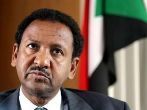Sudan rejects proposed UN resolution on Darfur
CAIRO, Sept 15 (AFP) — Sudanese Foreign Minister Mustafa Osman Ismail rejected a proposed new UN Security Council resolution on the country’s war-torn Darfur region, calling it “illogical and unbalanced.”
 “It is an illogical and unbalanced resolution,” Ismail told a press conference here.
“It is an illogical and unbalanced resolution,” Ismail told a press conference here.
“Sudan is open to an increase in the number of observers and to the creation of a fact-finding commission, or that the United States sends observers” to the region.
These measure would be on top of the “African observation mission,” said Ismail, who had been attending an Arab League meeting here.
The US-inspired draft warns the Sudanese government that if it does not meet its promise to re-establish security in Darfur, then the UN Security Council would consider sanctions.
Last week, a US draft said the council “will take action” including sanctions if Sudan fails to curb the Janjaweed militia in Darfur and take other steps to ease the crisis.
A new version on Tuesday said the council would “consider” sanctions.
The latest draft, obtained by AFP, maintains the threat of sanctions on Sudan’s oil industry, which drew some opposition when the Security Council first discussed the proposal last Thursday.
An estimated 50,000 people have died in Darfur, Sudan’s vast western desert region, and another 1.4 million have been displaced in what UN officials have called a campaign of ethnic cleansing by Arab militias against black Africans.
Washington has called the bloodshed there “genocide”, a term Ismail said had complicated talks organisation by the African Union in the Nigerian capital, Abuja.
“The negotiations have been complicated but have not collapsed,” he said, adding that they would resume in October.
One of two rebel movements engaged in peace talks with Sudan’s government mediated by the African Union said Wednesday the negotiations had collapsed and could be suspended for weeks.
Mohammed Ahmed Tugod, the chief negotiator for the Justice and Equality Movement, told AFP “the negotiations have collapsed already because there are differences, strong differences between us and the Sudanese government.
“The AU is now suggesting to suspend the talks for four weeks, and for us it as if the talks have collapsed,” Tugod said.
Ismail said: “Contacts continue with the United States, in spite of Washington’s position.”
He said a US envoy would soon come to Sudan, and suggested that the American administration spoke one way for public opinion and had a different position in its contacts with the Sudanese government.
